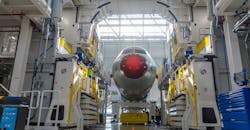Latest Airbus Jet Order Worth Billions
Airbus reports a firm order for 60 new A321neo jets from a Saudi Arabian start-up airline, Riyadh Air. Though the manufacturer did not reveal the value of the order, the reported list price of the A321neo suggests the contract could be as much as $3.48 billion.
Riyadh Air is owned by the nation’s Public Investment Fund, and last year ordered more than three dozen Boeing 737 MAX 9 jets as part of a strategic plan to establish Saudi Arabia as “a global aviation hub,” and to serve 330 million passengers and 100 million visitors annually by 2030.
No schedule for deliveries was announced by Airbus, but Riyadh Air reportedly seeks to begin passenger flights by summer 2025. It aims to serve more than 100 destinations in the Middle East and six other continents, and has arranged code-sharing agreements with Delta Air Lines and other SkyTeam members, as well as several Star Alliance carriers.
The A321neo is a narrow-body, twin-engine jet with capacity for 206 passengers in a two-cabin arrangement. It has the longest fuselage among the variants of Airbus’ top-selling A320 series. The OEM has recorded more than 6,700 orders for A321neo jets since it was introduced in 2011.
Airbus also notes that the A320neo series produces 50% less and achieves more than 20% greater fuel savings and CO₂ reduction than the previous generation single-aisle aircraft.
“This investment will not only enable us to support economic growth in the aviation industry; it will ensure Riyadh Air operates one of the most fuel-efficient fleets. It’ll be instrumental in helping Saudi Arabia achieve its decarbonization goals,” stated CEO Tony Douglas. “This deal strongly reinforces the positive economic impact of Saudi Arabia’s newest airline on both a global and local scale to facilitate the fast-growing Saudi aviation ecosystem.”
